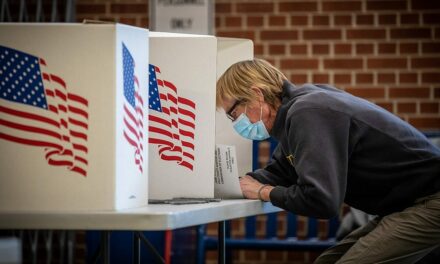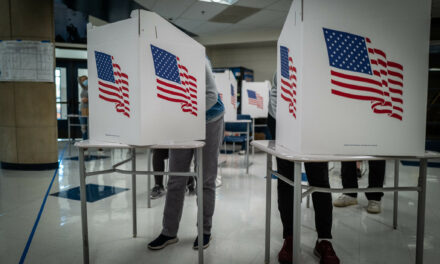We support our Publishers and Content Creators. You can view this story on their website by CLICKING HERE.
Sue Mazzarini said she was surprised last month when Fairfield County Board of Elections training staff skipped over a training session on ensuring only legally permissible forms of photo identification are used to vote. The Baltimore, Ohio, poll worker was well aware of Secretary of State Frank LaRose’s June training directive mandating that all Precinct Election Officials (PEOs) are trained on unacceptable forms of voter ID, including identification issued to noncitizens, who are not allowed to vote in U.S. and Ohio elections. With thousands of foreign nationals showing up on state voter rolls — including hundreds in Ohio and possibly many thousands more — LaRose is right to be concerned.
But when Mazzarini asked her group’s trainer about the missing curriculum, she said she was treated to a browbeating lecture.
“She [the instructor] said, ‘You are not the ID police. That is not your job. If that is what you want to do I recommend you search out an entity that will allow you to use those skills, but that is not what you are here for,’” the poll worker told me in a phone interview on Friday afternoon.
Mazzarini said she later asked another instructor, who responded even more tersely.
“He said, ‘If you decide to pursue this avenue we will remove you from being a poll worker and you can never work as a poll worker again,” Mazzarini said.
She’s not alone.
‘Failed to Comply with Its Clear Legal Duty’
Ohio election integrity advocate and poll worker Marcell Strbich said he experienced the same issue at a pre-election training session conducted by the Montgomery County Board of Elections. Once the course turned to the ID recognition section, Strbich said, instructors mentioned nothing about identifying noncitizen identification. Well-versed in election integrity matters and not shy about questioning the experts, Strbich asked about the omission. He was told that the material was not available for that class. Strbich said he followed up with other poll workers taking the training in subsequent sessions. They told him they didn’t receive any training on checking noncitizen ID, either.
“I learned multiple other poll workers had the same problem,” Strbich told me in a phone interview on Friday afternoon. In fact, he said, the problem appears to be systemic. Strbich said poll workers in Knox, Miami, Wood and Franklin counties experienced similar training omissions. Franklin County, the state’s most-populous county, is home to Ohio state capital Columbus.
The Precinct Election Official took his complaint to the Ohio Supreme Court seeking a writ of mandamus to demand state boards of elections conduct the training as spelled out in the secretary of state’s directive. The court took the case and put it on an expedited timeline. Strbich’s lawsuit asserts “the integrity of the forthcoming general election is threatened by the failure of the MONTGOMERY COUNTY BOARD OF ELECTIONS and its members to comply with their legal duties.”
Late Friday, the Supreme Court issued a ruling in large part agreeing that the Montgomery Board of Elections “failed to comply with its clear legal duty to provide training in accordance with secretary of state’s directive.”
‘Not Acceptable’
The complaint, filed on Sept. 30, cites the secretary of state’s directive, which states Ohio boards of elections “must use training materials prepared by the Secretary of State’s office as well as additional materials prepared by the board or on behalf of the board for the board’s specific needs including best practices.” PEO training specifically must include instruction on:
“How to verify a voter’s identity with the photo ID card provided by the voter,” and “How to ensure that only legally permissible forms of photo ID are accepted and that PEOs are trained on unacceptable forms of photo ID, including photo IDs issued to non-citizens.”
Ohio Bureau of Motor Vehicles-issued photo IDs provided to foreign nationals now contain a noncitizen notation on the back of the photo ID and license. But it is a small notation, and could be easily missed by poll workers.
“State of Ohio noncitizen identification also known as a Non Renewable/Non Transferable credential, is not acceptable” as a form of identification for voting, according to the secretary of state’s Precinct Election Training Manual.
The Montgomery County Board of Elections responded last week, asking the court to dismiss Strbich’s complaint with prejudice. Among its eight defenses, the filing claims Strbich, an Ohio resident and voter — not to mention a Precinct Election Official —, doesn’t have standing, and that he failed to exhaust administrative remedies.
Reached for comment on Friday, Montgomery County Board of Elections deputy administrator Russ Joseph told me that he did not have much to add because the litigation was still in a “holding pattern.”
“With that said, our PEOs are receiving thorough training and getting everything they need before Election Day,” he said.
In February, the Board of Elections ordered Joseph to take his own training course on public records law after he acknowledged that he had released a confidential county prosecutor memo to the chairman of the county Democratic Party, who was challenging former Trotwood Mayor Mary McDonald’s Republican primary candidacy,” according to the Dayton Daily News.
In a reply to the BOE’s motion to dismiss, Strbich’s attorney argued the county’s failure to train elections officials on noncitizen IDs is not in dispute. Strbich has documented three separate occasions in which the Board of Elections failed to provide the training. The Board, in fact, “now concedes that, at a minimum, all training it provided for precinct election officials during the day on September 25, 2024, and prior to that date, did not address the unacceptable forms of photo identification cards, including those for non-citizens,” the reply notes.
The Montgomery County BOE said it would, at the the end of the training season, email affected election workers “updated slides, training pieces and the training material on legally permissible photo IDS or unacceptable forms of photo ID for noncitizens,” according to the court filing. It argued that the “remedial action” had yet to be taken.
Strbich argues that even the Board of Elections “implicitly acknowledges” that sending up follow-up emails with training materials is a pale substitute for actual training.
In granting the writ of mandamus in part, the Ohio Supreme Court found that while the BOE did update its training materials to comply with the directive, “affected classes of individuals did not receive the updated training.” But the court decided that emailing updated training materials is good enough.
Strbich said he’s satisfied with the ruling, but it needed to go farther.
“Ohio’s Supreme Court recognized and moved to remedy the noncitizen poll worker training deficiencies, however the secretary of state should further enact directives to ensure on Election Day, before poll workers take their oath, that the voting location manager instructs them personally on what specifically to do,” the election integrity advocate told me in a phone interview on Sunday.
‘Especially Alarming’
The people of Ohio have made absolutely clear that they do not want foreign nationals voting in Buckeye State elections through the overwhelming passage of a 2022 constitutional amendment.
“Only a citizen of the United States…has the qualifications of an elector, and is entitled to vote at all elections. No person who lacks those qualifications shall be permitted to vote at any state or local election held in this state,” the amended language states.
As of March, the state of Ohio had issued more than 223,000 noncitizen IDs, according to Ohio Department of Public Safety data Strbich obtained in a public records request.
With an unprecedented number of foreign nationals pouring into the United States on the Biden-Harris administration’s watch, and with Democrats opposing basic measures requiring proof of citizenship to vote, election integrity advocates are understandably concerned about the potential of nonciizens voting in the pivotal general election. The issue is particularly pressing in swing states that are once again likely to decide the presidential election by razor-thin margins.
Last week, several congressional Republicans sent Attorney General Merrick Garland a letter voicing concern about the DOJ’s failure to do anything about the growing number of foreign nationals on state voter rolls. Garland, a bitter partisan leftist who has weaponized the Justice Department against Democrats’ political enemies, not surprisingly has ignored a prior request for information.
“We are deeply concerned by reports of non-citizens registering to vote and voting in federal elections,” the letter to Garland, signed by more than 70 Republican members of Congress. “As of today, there has been no response from you or your Department regarding the inquiry on July 12, 2024, seeking information on efforts undertaken by your Department to enforce laws prohibiting non-citizen voting. Given that the 2024 Presidential Election is in less than 34 days, your Department’s inaction and refusal to provide any information regarding its efforts to promote public trust and confidence in our elections is especially alarming.”
Federal law mandates states accept the federal voter registration form, which requires no proof of U.S. citizenship but instead allows for an honor system in which registrants check a box attesting to their citizenship. While lying on the form is a felony, citizenship claims are generally taken at the voter’s word.
Christina Adkins, director of election in the Texas Secretary of State’s office, reportedly issued contradictory guidance on noncitizen photo IDs. In a memo sent last week, Adkins wrote that the office has “consistently made clear that Texans should not use” driver’s licenses and other types of IDs issued to foreign nationals to participate in elections, “even if it otherwise constitutes a valid form of ID.”
Elections officials should inform the individual that the ID presented “suggests that the individual is not a United States citizen,” Adkins advised. But then she directs elections officials to offer a regular ballot to the individual if he “does not have further questions or concerns and wishes to proceed to vote.” It is possible that the individual received naturalized U.S. citizenship status after the limited-term ID was issued, Adkins notes. It’s also possible the individual is still a foreign national ineligible to vote.
Texas Secretary of State Jane Nelson late Friday updated the conflicting guidance, requiring individuals present proof of naturalization with a noncitizen ID to vote with a regular ballot.
“Secretary of State Nelson did the right thing. Her amended election advisory closes a potential loophole that could have allowed noncitizens to attempt to vote,” Lone Star State Attorney General Ken Paxton said in a statement. “Texas must do everything in its power to prevent noncitizens from voting, and this is a critical step toward securing our elections.”
‘It Is No Optional’
In Ohio, LaRose has weighed in on the reported lack of poll worker training in Fairfield County. In a statement to The Federalist, the secretary of state wrote that his office has investigated the allegations and found the Board of Elections “had not fully complied” with his June directive on vetting noncitizen IDs. LaRose added that the board members have “accepted responsibility and quickly implemented a plan to correct the error.”
“We worked with them to ensure they’ve taken all necessary steps to update their training materials, as well as provide that information to anyone who’s previously completed the training. I’ve also sent my team to audit the county’s most recent training sessions, and I’ve asked my Election Integrity Unit to be on alert for similar issues in other counties,” LaRose said.
Officials from the Fairfield Board of Elections did not respond to The Federalist’s request for comment.
Strbich said there are several counties in the state ignoring the required training and LaRose hasn’t held any of their top elections officials accountable. He’s further concerned that it appears individuals with noncitizens IDs’ may use naturalization documents and receive a regular ballot — not a provisional one — without any vetting from election officials.
Under Ohio election law, a member, director or employee of a local board of elections who “willfully or negligently violate[s] or neglect[s] to perform any duty imposed upon him by law, or willfully perform[s] or neglect[s] to perform it in such a way as to hinder the objects of the law, or willfully disobey[s] any law incumbent upon him so to do…. shall be dismissed from his position as a member or employee of the board and is guilty of a felony of the fourth degree.”
LaRose told the Ohio Press Network that compliance is “not optional.”
“We’ve been in contact with the boards daily on this requirement. IT IS NOT OPTIONAL, and there will be consequences for noncompliance,” he said in response to the complaint filed by Mazzarini, the Fairfield County poll worker.
Mazzarini told me that she wouldn’t be surprised if she faces reprisals from the Fairfield County Board of Elections for raising the issue and asking questions.
“I’m waiting for a letter from them telling me I can’t be a poll worker,” she said.
Matt Kittle is a senior elections correspondent for The Federalist. An award-winning investigative reporter and 30-year veteran of print, broadcast, and online journalism, Kittle previously served as the executive director of Empower Wisconsin.

 Conservative
Conservative  Search
Search Trending
Trending Current News
Current News 





